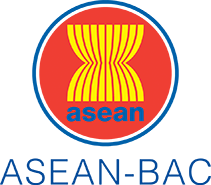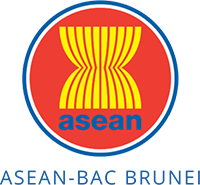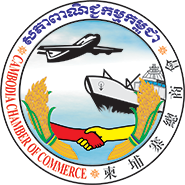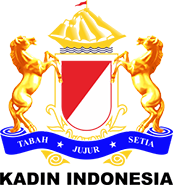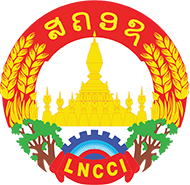summary
October 28th (Wed) 2020
Kick-off Webinar Acceleration of Digital Innovation in ASEAN and Japan’s Contribution
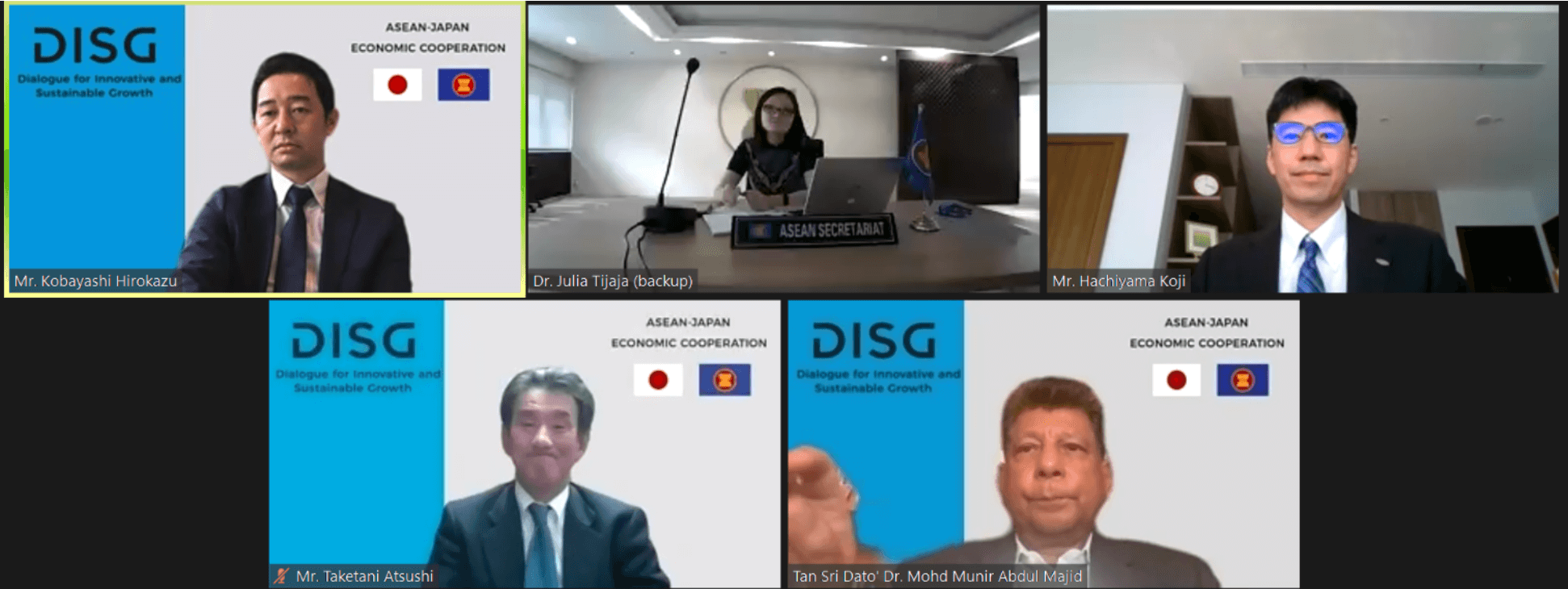
Agenda
1. Opening remark from METI
2. Keynote speech from ASEC
3. Keynote speech from JETRO
4. Panel discussion among ASEC, JETRO, ASEAN-BAC, and ERIA
Speaker
-
Mr. Hirose Naoshi,
Director-General, Trade Policy Bureau, Ministry of Economy, Trade, and Industry(METI), Japan -
Dr. Julia Tijaja
Director, ASEAN Integration Monitoring Directorate, ASEAN Secretariat(ASEC) -
Mr. Taketani Atsushi
Chief Representative for ASEAN, Japan External Trade Organization (JETRO) Bangkok -
Tan Sri Dato' Dr. Mohd Munir Abdul Majid
Chairman, ASEAN-BAC Malaysia and Chairman, CIMB ASEAN Research Institute (CARI) -
Mr. Hachiyama Koji
COO, Economic Research Institute for ASEAN and East Asia (ERIA)
Moderator
-
Mr. Kobayashi Hirokazu
Chairman, AMEICC Task Force of DISG and Executive Director, JETRO Singapore
Webinar Summary
This webinar was held as a kick-off webinar of the “Dialogue for Innovative and Sustainable Growth (DISG)” which was endorsed by ASEAN and Japan Economic Ministers at the AEM-METI Meeting on August 28th in 2020. In this webinar, key figures from ASEAN and Japan discussed how to accelerate digital Innovation in ASEAN to overcome the current economic crisis and achieve further prosperity beyond it.
(Opening Remark)
The webinar began with Mr. Hirose Naoshi’s opening remark where he looks back on joint effort between ASEAN and Japan in response to COVID-19 and shares his point of view on the future of ASEAN-Japan collaboration and the potential that Dialogue for Innovative and Sustainable Growth could bring knowledge cooperation among the experts from various sectors to create solutions for the current crisis and evolve into a greater social and economic achievement.
(Keynote Speech from ASEC)
Dr. Julia Tijaja provides her key insight into the Recovery Framework as a solution to ASEAN countries of the issue brought upon by COVID-19 where it identifies the loophole in the current system and provides a concrete action plan to utilize. Moreover, she also points out the value of digital transformation where it will be the key to the 4th Industrial Revolution and bring substantial productivity to the economy and a whole.
(Keynote Speech from JETRO)
Mr. Taketani Atsushi delivered his key point regarding the long and rich economic relationship between ASEAN and Japan especially in terms of investment and creating jobs. Mr. Taketani said that Japan puts emphasis on “Resilience of Supply Chain” and “Digital Technology” in ASEAN after Covid-19 outbreak and JETRO began supporting Japanese companies to invest for resilient supply chain. He had also presented examples of joint pilot DX projects between ASEAN and Japanese companies to solve socio-economic challenges.
(Panelist Discussion)
The panel discussion is started with comments from Dr. Munir on the necessity of ASEAN and Japan collaboration followed by the 4th Industrial Revolution (4IR) and how the collaborators should prepare for the outcome of the revolution and how to support those that required knowledge and infrastructure preparations of the 4IR digital transformation.
Subsequently, Mr. Hachiyama Koji; COO of Economic Research Institute of East Asia provided his view on the crucial role of cybersecurity application to Data Free Flow with Trust (DFFT) to protect digital connectivity for ASEAN-Japan collaboration for digitization with mutual benefits.
Finally, in the panel discussion which is moderated by Mr. Kobayashi Hirokazu, the panelists discussed and provided insight on the Japanese selling point and potential challenge while providing support to ASEAN and along with giving auspicious comments on the ASEAN-Japan collaboration such as Dr. Julia identified the importance of digitalization, sustainability and supply chain connectivity and Dr. Munir specified that when society digitalize they must remember the outcome not just in terms of higher productivity but also people without infrastructure or skill who might be left behind.
Opening Remarks
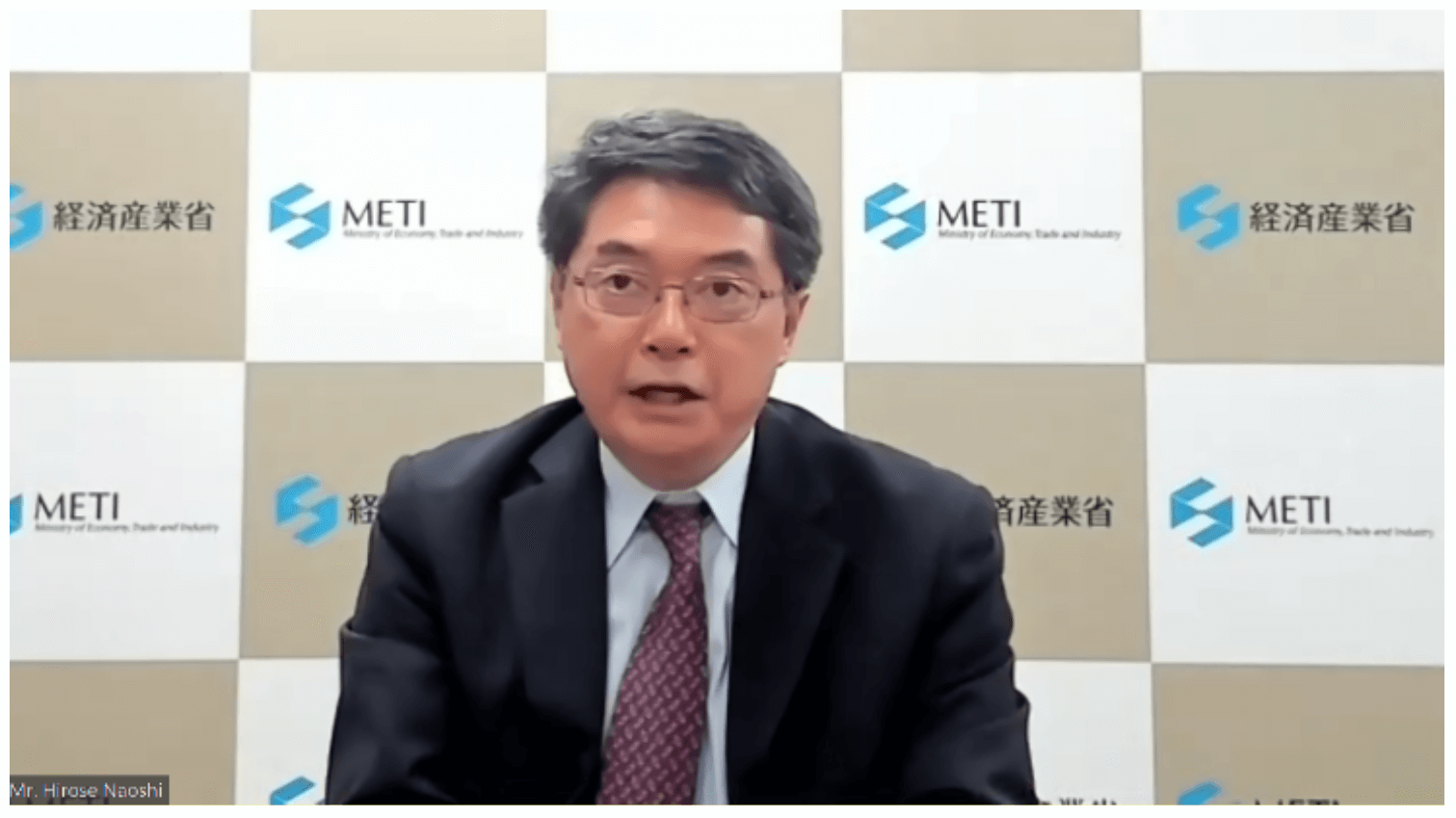
Mr. Hirose Naoshi Director-General, Trade Policy Bureau, Ministry of Economy, Trade and Industry (METI), Japan
We are pleased to hold the Kick-off webinar of "Dialogue for Innovative and Sustainable Growth", a new dialogue framework between Japan and ASEAN. We would like to thank the people concerned, such as ASEAN Secretariat, VCCI, ASEAN BAC, AJBC, and JETRO, for their cooperation in holding the event.
Japan and ASEAN have a long history of close economic so we should build on it and strengthen it through keeping the business running and keep trade and investment flow to mitigate the adverse impact.
Learn from this crisis by reinforcing the economic capability and come up with something concrete to cope with COVID-19 issue.
The prime reason for DISG is to gather people for the idea on the concrete project for future solutions. It was as early as April when ASEAN and Japan have started our dialogue to launch our collective initiative on how we should approach this issue. Since then ASEAN and Japan have set an online activity to bring together various ideas from both sides to discuss the viable option. This discussion has materialized as a ASEAN-Japan economic action plan that we issued in July which includes more than 50 specific projects and we are very happy that ASEAN and Japan are one of the first to come up with such a concrete plan. As a prime for this dialogue, now it is time for implementation and I believe that it would be best served by involving various stakeholders through gathering good ideas and discussion. This dialogue is emphasized in two ways of communication between ASEAN and Japan an equal partner which is what cooperation is all about.
Now DISG is a series of webinars that showing the cooperative projects between ASEAN and Japan in various fields to facilitate discussions among experts from the private, public, and academic sectors.
I strongly hope that the economic relations between ASEAN and Japan will be elevated through this DISG
Keynote Speech
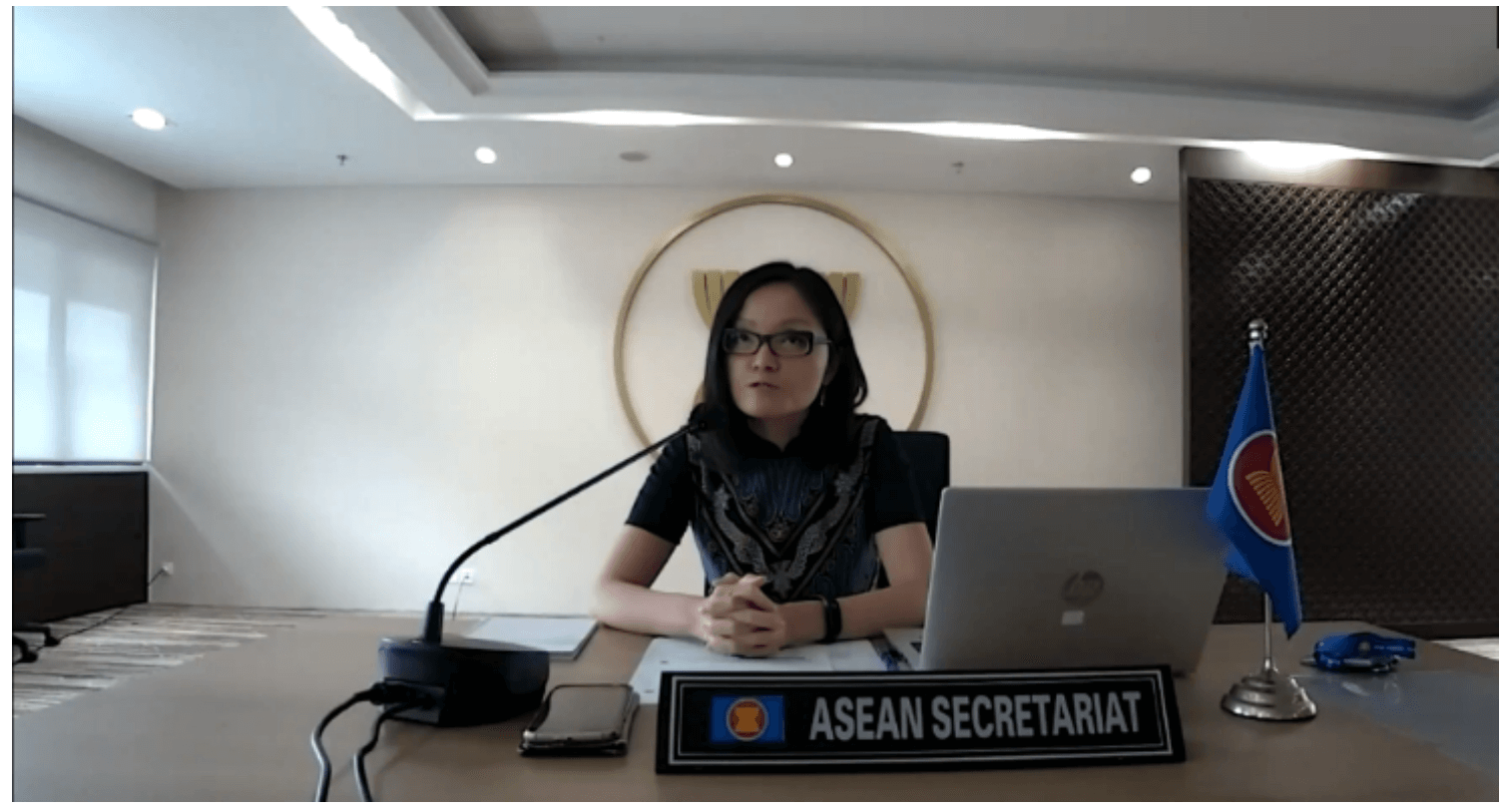
Dr. Julia Tijaja Director, ASEAN Integration Monitoring, the ASEAN Secretariat (ASEC) Providing her insight on the current economic crisis caused by COVID-19 follow by the recovery frame work and the future of digitalization to strengthen ASEAN.
ASEAN Comprehensive Recovery Framework
- Enhancing Health Systems
- Strengthening Human Security
- Maximising the potential of Intra-ASEAN market and broader economic integration
- Accelerating inclusive digital transformation
- Advancing towards a more sustainable and resilient future
In terms of healthcare system, the framework is aim to provide solutions to the key issues in the healthcare system identified during COVID-19 pandemic in order to strengthen the healthcare capability as a recovery action and create a suitable response for the future.
The framework will cover not only the immediate impact but also the 3Rs: Reopening, Recovery, and Resilience where countries will coordinate with each other so they can safely reopen their economy and work together to recover and strengthen each other for the long term. Regarding reopening, ASEAN-Japan Comprehensive Economic Partnership (AJCEP) and its implementation would support for ASEAN to keep the markets open and to strengthen the global supply chain. This is not limited to the economic recovery plan but also contributed to the 3 pillars of ASEAN Political-Security Community, Economic Community, and Socio-Cultural Community.
ASEAN-Japan Economic Resilience Action Plan is one of the concrete actions that ASEAN has to work with partners together and its coverage is close to ASEAN Comprehensive Recovery Framework.
Digital Transformation
Dr. Julia indicate that digital technology has uplift the broad economy as a whole beyond the sector which could improve ASEAN overall GDP through increase efficiency and connections between ASEAN nations’ economy. However, issues among the developing rural area for digital access, regulatory requirement and limited capacity still remain to be solve.
As a result, cooperation between countries and expertise are important to further drive the existing momentum to achieve the potential and goes beyond the recovery with greater economy resilience for every party.
Keynote Speech
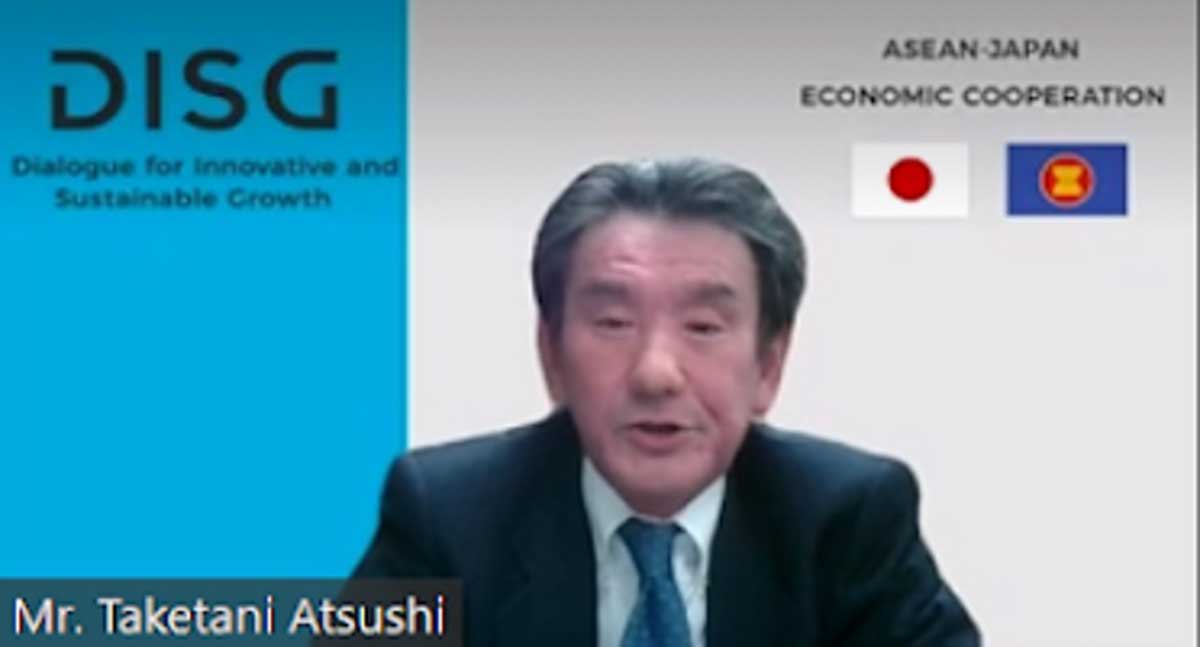
Mr. Taketani Atsushi Chief Representative for ASEAN, Japan External Trade Organization (JETRO) Bangkok explaining ASEAN and JAPAN building ever closer partnership to achieve innovative and sustainable growth by leveraging digitalization.
ASEAN-Japan Relationship
Japan has a strong economic bond with ASEAN for a long time and has been the top destination for Japan’s investment in Asia. The number of Japanese companies in ASEAN grows higher than the rest of the world, and they show strength in a particular manufacturing sector which contributes to creating jobs.
The new Prime Minister of Japan Suga Yoshihide paid his first overseas trip to ASEAN which emphasizes how Japan holds ASEAN in high regard with a heart-to-heart relationship. In his speech, he reiterated Japan’s commitment to ASEAN, and the importance of supply chain resilience and digital technology.
Supply Chain Resilience and Digital Technology
Since the beginning of the COVID-19 crisis, supply chain resilience has become more important in ASEAN. Japanese companies have tried to strengthen their supply chain after the big earthquake in 2011. Promoting such actions in ASEAN after the COVID-19, JETRO provides financial support for not only introducing equipment but also proof of concept applying digital technology to supply chain.
As one example for digital application to supply chain, 7 major Japanese cooperation launched a Digital Trade Platform called “Trade Waltz”. It will enable trade transaction without paper and largely reduce cost according to METI research.
JETRO Projects Support for Digital Transformation
Furthermore, JETRO does not limit the digitalization support to the supply chain. JETRO began financial support to joint pilot project between ASEAN and Japanese companies utilizing digital technology and addressing socio-economic challenges. JETRO adopted 23 projects in medical & healthcare, agriculture, fisheries, tourism & mobility, environmental & energy, and manufacturing & HR on October 14th as the 1st batch.
JETRO continues to support Japanese companies collaborating with ASEAN companies in digital field.
Panel Discussion
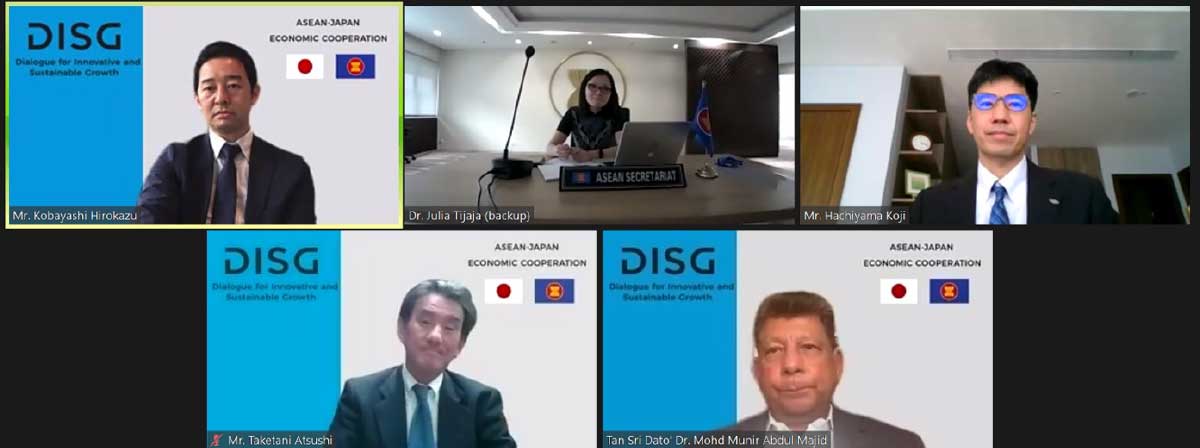
Idea on how to recover economy from perspective of industrial sector
Dr. Munir
- There are almost 35 items related to digital in “Pathway 225” released in July. Among them especially public health is important because people can easily understand digitalization is good. When we approach to digital transformation, we should look at two sides not only of cost and productivity but also sustainability and longevity.
- Currently, ASEAN countries are at different stages of 4IR. To ensure future efficiency in economic recovery, 4IR readiness has to be put into consideration to identify which country needs more support because 4IR will bring social impact. It is estimated that 28 million Jobs replacement and 4.9 million workers will need to be reskilled in 2028.
- Japan’s FDI in ASEAN is not concentrated on Singapore unlike other investors. In terms of trade facilitation, Japan is good partner for ASEAN because non-tariff barriers on AMSs are low level and Japan tries to introduce a digital platform which Mr. Taketani mentioned.
Mr. Hachiyama
- How COVID-19 further highlighted the importance of the utilization of digital technology and accelerated the speed of its implementation. It include the introduction of several findings in recent research, such as possible development by leapfrog or feedback, the necessity of digital human resource development as well as the development of regional digital connectivity in terms of hard and soft including Data Free Flow with Trust (DFFT).
- Collaboration of Digital Transformation between ASEAN and Japan should be expanded to Region wide. Therefore, it is important to build a foundation for DFFT through building hard infrastructure, the legal system, data common platform, consistency of data format and compatibility/interoperability to be ready for digitalization collaboration for mutual benefits of ASEAN and Japan.
What is the "Selling point" of Japan?
Mr. Taketani
- Japanese companies have human-centric attitude and long-term commitment toward ASEAN region.
- Japan is a country of technology and the manufacturing sector has its strength. Japan can offer technology especially in the combination of manufacturing and digitalization.
- Japanese companies and people are very detailed oriented so Japan could offer various specific solutions to different projects.
Dr. Julia
- Focusing on technology leverage to support supply chain resilience.
- People-centric in developing the human capital of MSME.
- Advocate for the use of technology for sustainability and Japan is well known for working on society 5.0 to solve social problem by connecting cyber and physical.
Dr. Munir
- Mentoring and engaging with the MSME and putting them on the value chain of the bigger company such as Japanese companies identify the quality and price of the product to reach the world-class market stage.
- Japanese companies can link up with the ASEAN digital startups and make them bigger through investing, buying, or giving them access to the larger market.
Potential Contribution from Japan in the Context of institutional framework and regulatory arrangement
Mr. Hachiyama
- Regarding the digital transformation, one of the challenges is cybersecurity. There are disparities in cybersecurity level among AMSs. ASEAN has to narrow the development gap in cybersecurity capability. This is where Japan can support with advanced cybersecurity experience and technology through cyber security training with US in Indo-Pacific region and ASEAN-Japan Cybersecurity Capacity Building Center.
Reiterate your expectations for ASEAN-Japan cooperation
Dr. Julia
- Digitalization, sustainability and supply chain connectivity.
Dr. Munir
- When we digitalize we must remember the outcome not just in terms of higher productivity but also people without infrastructure or skills who might be left behind.
Mr. Hachiyama
- For DFFT wider area can bring a greater benefit thus Japan-ASEAN collaboration is very important and can potentially lead the world economy.
Mr. Taketani
- Without ASEAN Japan cannot have a bright future. In that sense ASEAN is an indispensable partner for Japan. The Japanese government and JETRO will do the best to promote digitalization and supply chain resilience not only promoting the deployment of ASEAN but also for the global economy.
Plans for the future
Mr. Kobayashi
- This is just a kick-off webinar of DISG which is comprised of a series of webinars. Important individual issues which panelists mentioned today will be discussed in future webinars and we plan that our next webinar will focus on “Digital Trade Connectivity” in mid-November.
Subscribe
If you wish to be on the DISG mailing list to get information on upcoming events or to receive e-magazines and newsletters, please fill in the following form. You will receive a confirmation email.
Contact Us
Please feel free to ask us anything about DISG.



